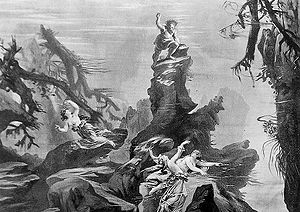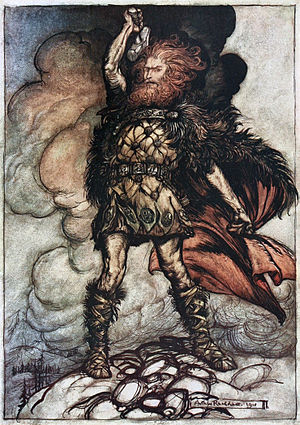|
Vikidia currently has 4,624 articles. Improve it! |
|
Join Vikidia: create your account now and improve it! |
The Rhine Gold
|
|
You're reading a star article
The Rhine Gold isn't the only star article → Find more of them! |
The Rhine Gold (German: Das Rheingold) is a one-act opera. It is based on German and Scandinavian mythology. Richard Wagner wrote both the words and music. It is the first opera in his four-opera Ring cycle. This cycle tells the story of a hero named Siegfried and of a magic ring that gives its possessor power over the entire world.
After a preview performance in Munich, Germany in 1869, The Rhine Gold officially premiered at the Bayreuther Festspielhaus in August 1876 with the other operas in the cycle. The performance of the complete Ring was a great success. Today, the Ring cycle is considered one of the monumental works of world art.
Background[edit | edit source]
The Rhine Gold is the first opera in Wagner's cycle of four operas called The Ring of the Nibelung. The cycle follows the life and deeds of the hero Siegfried, and depicts the end of the gods and their way of life. This disaster is brought about by a magic ring. Themes are greed, envy, deceit, and the redemptive power of a woman's love.
The four operas in the cycle are The Rhine Gold, The Valkyrie, Siegfried, and Twilight of the Gods. Wagner started work on the Ring in 1848. He originally thought only to tell of Siegfried's death in an opera eventually called Twilight of the Gods. He decided though that the hero's entire life story had to be told.
After completing the texts for the last three operas in the cycle, he decided to tell the story of events preceding the hero's life in a "prelude" opera, The Rhine Gold. With the texts complete, Wagner began the musical composition of the cycle in performance order. The first opera completed was The Rhine Gold.
The completion of the Ring was interrupted by the composition of the operas Tristan and Isolde and The Mastersingers of Nuremberg. In 1875, the Bayreuther Festspielhaus was finished with funds from King Ludwig II of Bavaria. Wagner specifically intended this opera house for performances of the Ring. In 1876, the Ring was completed, and went into rehearsal.
First performances[edit | edit source]
The Rhine Gold was first performed at the National Theatre in Munich, Germany on 22 September 1869. Wagner opposed this performance. He wanted the opera to premiere with the other operas in the cycle. His patron, King Ludwig II of Bavaria, however insisted upon this preview performance. The opera later received its premiere as part of the complete Ring cycle on 13 August 1876, in the Bayreuther Festspielhaus, Germany. This world premiere of the complete Ring was an artistic triumph. Today, the cycle is considered a monument of world art.
Characters in The Rhine Gold[edit | edit source]
The Gods
- Wotan, chief of the gods (bass-baritone)
- Fricka, his wife (mezzo-soprano)
- Freia, the goddess of youth, love, and beauty (soprano)
- Loge, god of fire and cunning (tenor)
- Donner, god of thunder, storms, and wind (bass-baritone)
- Froh, god of spring and virility (tenor)
- Erda, primeval goddess of the Earth (contralto)
Giants
- Fasolt (bass-baritone)
- Fafner (bass)
Niebelungs
- Alberich, a dwarf (baritone)
- Mime, a dwarf (tenor)
Rhine Maidens
- Woglinde (soprano)
- Wellgunde (soprano or mezzo-soprano)
- Flosshilde (mezzo-soprano)
Story[edit | edit source]
Scene 1
A fabulous treasure lies deep within the waters of the Rhine River. It is called the Rhine Gold. This gold is guarded by the three Rhine Maidens.
The Nibelung dwarf, Alberich, wants the gold. The Rhine Maidens explain to him that whoever forges the gold into a ring will have complete power over the entire world. First, however, he must renounce love.
Alberich flirts with the Rhine Maidens, but he is crude and ugly. The Rhine Maidens reject him as a sweetheart. Alberich renounces love, and steals the gold.
Scene 2
The giants Fafner and Fasolt have built a fortress home for the gods. Wotan has promised to give Freia to them as payment for their labor. Wotan does not intend to honor his promise, and is looking for another way to pay the giants.
In the meantime, Alberich has forged a ring from the Rhine Gold. He has enslaved his fellow Nibelung. Loge suggests that this ring (and Alberich's other treasures) be given to the giants instead of Freia. The giants accept this offer. They hold Freia hostage until the debt is paid.
Scene 3
Loge and Wotan go to Alberich's underground home. Wotan takes the ring from him, as well as his other treasures. These treasures include a magic helmet called the Tarnhelm. Alberich curses the ring: worry and death shall be the fate of its possessor.
Scene 4
The giants accept the treasure as payment. They release Freia. Wotan wants to keep the ring. Erda warns him that the ring will destroy the gods. He gives the ring to the giants. Fafner does not want to share the ring, and kills Fasolt. The Rhine Maidens are heard mourning the loss of the Rhine Gold. The gods enter their new home, Valhalla. This is where they hope to live in bliss for eternity, but the seeds of destruction have been sown.
Musical highlights[edit | edit source]
- Prelude
- Rhine Maidens' Song
- Loge's Narration
- Descent to Nibelheim
- Alberich's Curse
- Erda's Warning
- Donner's Song ("Heda! Heda! Hedo!")
- Rainbow Bridge Music
- Entry of the Gods into Valhalla
Other websites[edit | edit source]
- Richard Wagner – Das Rheingold. Gallery of historic postcards with motifs from Wagner's operas.
- Vocal score of Das Rheingold
- Complete libretto of the opera, in German
- Complete libretto of The Ring Cycle in English and German
- Das Rheingold on DVD
- Das Rheingold OGG Recording 1950 - Furtwängler, Orchestra del Teatro alla Scala di Milano

|
Opera Portal — All articles about opera, opera houses, opera singers, opera composers, opera librettists, opera set designers, and more! |





